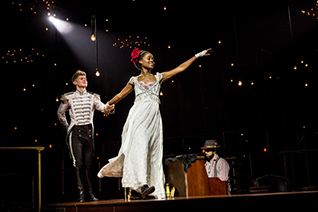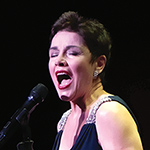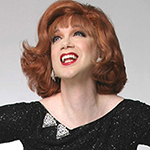Natasha, Pierre & The Great Comet of 1812
Imperial Theatre, NYC, November 16, 2016
Reviewed by Elizabeth Ahlfors for Cabaret Scenes

Photo: Chad Batka.
It’s been quite a journey. After premiering at the intimate Ars Nova theater, moving to the Kazino tent, and on to a midtown space, Natasha, Pierre & The Great Comet of 1812 explodes as an immersive electropop hurricane of action over and around Broadway’s Imperial Theatre. Adapted from Part 2 of Leo Tolstoy’s classic War and Peace, composer/lyricist/librettist Dave Malloy’s contemporary slang with electronic music brings new vibrancy to the old world 19th century Russian aristocracy.
Be forewarned. Malloy lets you know right from the start that this spectacle, while flamboyantly wrapped in gilt and red velvet, is a tale with a lot to tell. “Prologue,” the opening number, cleverly introduces the characters, hinting that you may have to refer to your Playbill to keep up with who’s who. (“Cuz it’s a complicated Russian novel/ Everyone’s got nine different names”). Put concisely, however, the play is a sung-through “electropop opera,” part love story and part philosophical meditation, at a time when Napoleon’s troops are battling through Russia.
Do not expect to be humming any of the “arias” as you leave the theater, though much of the music is melodic with appealing lyrics. Lovely newcomer Denée Benton shines in her Broadway debut as a charming Natasha, with an exquisite singing voice. Young and wide-eyed, Natasha is engaged to Andrey (Nicholas Belton), a soldier on the front. She delivers a haunting ballad early in the show, “No One Else,” reflecting her despair as she misses Andrey.
In the style of historical romance, Natasha and her cousin Sonya (Brittain Ashford) visit her godmother Marya D. (Grace McLean) in Moscow where she first meets Anatole (Lucas Steele), a dashing married scoundrel.
Protagonist Pierre (Scott Stangland substituting for Josh Groban in this performance), after living a self-centered life, is now on a somber search for meaning. He is married to Hélène, a delicious bad-girl played by Amber Gray. Since Hélène travels in Moscow’s patrician circles, she delivers a fetching invitation, “Charming,” to Natasha and her family to attend a ball. Here Natasha again meets Anatole and they begin their fleeting but passionate affair.
In Act 2, Natasha breaks her engagement to Andrey and Sonya aims to foil her cousin’s new plans to elope with Anatole. Sonya adds her lush voice to Natasha’s in the duet “Sonya and Natasha,” and follows with a touching solo aria, “Sonya Alone.” It is Pierre, however, who eventually saves the day, leaving behind his lifelong gloom reflected in his ballad “Dust and Ashes.” He soars in the company’s finale, “The Great Comet of 1812,” as he and Natasha find enlightenment.
Stangland is a worthy Pierre, stockier than Groban, and with a robust gravely tone that is provocative, if not as crystalline as Groban’s pure tenor vocals.
While the production shows moments of lethargy, imaginative director Rachel Chavkin is energizing, with mixes of rock, pop, Russian and electronic dance music, using the entire reconfigured Imperial Theatre as a grand stage. This concept brings Mimi Lien’s glorious setting, with chandeliers and lighting by Bradley King, where the traditional stage area provides stadium seating fronted by cocktail tables and chairs. Audiences are literally part of the show. The entire theater is used as performers dash through the orchestra, giving out pierogies. They dance up the pathways into the mezzanines and balcony, dressed in period glamour by Paloma Young. Adding to the splendor stagecraft is Sam Pinkleton’s Cossack-flavored choreography and Music Director Or Matias’ instrumentalists set in different areas.
Despite fuzzy segments, this show presents pure theatricality with groundbreaking star quality that will likely spell success.




